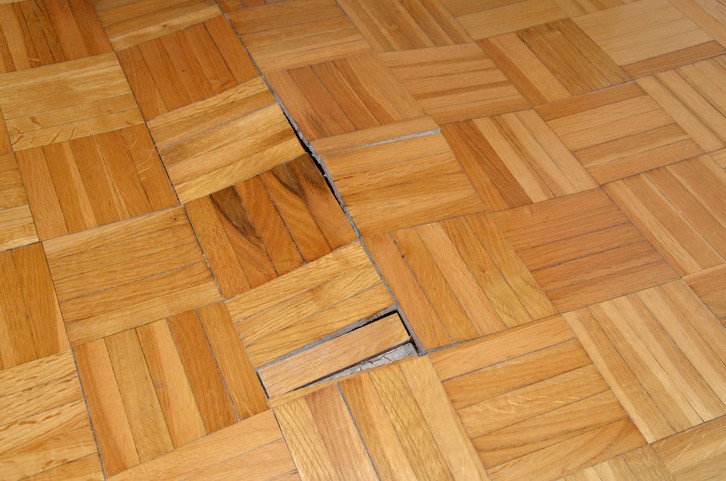Fastest Ways to Ruin Hardwood Flooring

Character, natural richness, beauty – just a few words describing hardwood flooring. But, as most everyone knows, unlike many tile and stone products hardwood is susceptible to damage or failure if one isn’t knowledgeable about how to care for it.
We get asked all the time about ways to protect and extend the life of hardwood floors. The first step is to equip yourself with the basics. We’ve written about simple tips in the past, but today we are going a little more in depth.
Humidity is the #1 enemy of hardwood
Whenever people ask what they can do to protect their hardwood floors, our answer is always ‘control the humidity in your home!” Claims related to improper maintenance by the homeowner of their relative humidity (RH) is far and away the number one cause of failed flooring applications.
Excessive humidity causes otherwise high-quality hardwood floors to distort or fail altogether. When humidity is too high, wood absorbs the moisture and swells. The good news is that engineered hardwood flooring, versus solid hardwood, is quite resistant to excessive moisture.
This is called…wait for it…dimensional stability. This simply means that the flooring is constructed in such a way that the individual planks won’t contract or expand with environmental changes (such as excessive humidity), especially when compared to traditional, solid hardwood. Be it engineered or solid hardwood flooring, too much humidity causes floors to swell, warp, bend and cup – often beyond the point of repair.
The same goes for too little moisture as well! Be careful in winter months; if your home is too dry the hardwood could contract causing big gaps between boards, failure of the urethane finish and other irreparable issues.
So, how do you maintain the delicate balance in humidity levels, especially in the high highs and low lows of Indiana summers and winters? A great place to start is making sure your air conditioning unit and furnace are up to snuff and properly and regularly serviced. Typically, hardwood manufacturers support the product warranty if the home has been stabilized between 30%-50% RH year-round. Depending on insulation factors, in order to achieve this constant range, your HVAC professional may recommend an in-line humidifier (attaches to your furnace) for colder months and/or dehumidification equipment for the summer months.
Using improper cleaning methods
Obviously, it is important to keep your hardwood floors clean and well-maintained but using the wrong cleaning methods can be disastrous.
Proper hardwood cleaning should be done primarily – if not exclusively – with hardwood cleaning products made for your specific flooring. You may be tempted to try other cleaning methods, especially ones your handyman or contractor swear by; just know that some common methods can be very harmful to hardwood.
Take a mop for instance. Harmless enough, but if your mop is too wet you run the risk of excess water or cleaners soaking into joints. And then the board edges could delaminate over time or worse. Only use a moderately damp mop in accordance with the manufacturer’s guidelines.
Other common cleaners like ammonia, vinegar or store-bought cleaners can take the shine out of your floors, yellow or distort the urethane finish, or cause other problems. Bottom line here – very important: maintain your hardwood exactly as instructed by the manufacturer so that your warranty is supported. Otherwise, you may be up a certain creek with a certain oar. And we all know how painful that can be.
Unprotected furniture means unprotected floors
Scuffs, scratches, gouges and scrapes may not ruin the structural integrity of your hardwood floors, but they can certainly make them seem old and worn before their time.
The first thing to check is ladies’ shoes with stiletto-type heels. If the rubber protective cap at the bottom of the heel is worn, the steel shaft can protrude through and easily destroy planks. And pebbles lodged in treads of tennis shoes can be a real problem. Regular wear and tear from shoes and pet nails are a contributor for sure, but couches, chairs and tables can be an issue as well.
Without rugs or furniture pads, every time a piece of furniture is moved there is a risk of scratching the surface of the flooring. If you are the type that frequently changes up the layout of your living space, those chances increase, obviously. But, do not fret: careful and thoughtful moving paired with a couple precautions helps minimize accidents. The easiest preventive measure is to apply felt pads to the bottoms of legs and chairs. These are inexpensive and you can get them from your flooring dealer. (We provide them at no charge to our customers).
Choosing the wrong installer
Another quick way to ruin hardwood floors? Failure by the installer to fully assess the spaces, substrates and structural conditions of the areas during the job planning phase. Installing the flooring does not require years of experience; assessing, planning, and taking preemptive steps to ensure warranties are supported is what separates professional flooring companies from unqualified service providers.
Tish Flooring takes great pride in our process from the first visit, to the installation to our follow up. We make sure the job is done right and that you are over the moon with your new floors, whether you go with rich hardwood, plush carpet, elegant tile or authentic laminate floors.
Not only do we take pride in our work, we make the process as simple and easy on our customers as possible by bringing samples to your home on your schedule – even weekends, evenings, whenever. Call 317-879-TISH (8474) today and let’s get started!

